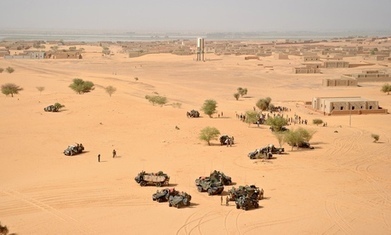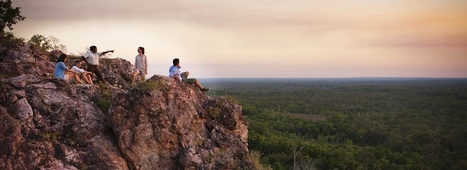In Madagascar, the booming charcoal business is contributing to deforestation and may exacerbate the effects of global warming.
Get Started for FREE
Sign up with Facebook Sign up with X
I don't have a Facebook or a X account
 Your new post is loading... Your new post is loading...
 Your new post is loading... Your new post is loading...

chao pan's curator insight,
June 15, 2017 6:50 PM
a good video to show how human activity negatively impacts the ecosystem. I will use this video in phase three

Chris Costa's curator insight,
December 1, 2015 4:27 PM
I have enjoyed the emphasis on the human aspect of geography in this course, and how geography impacts us. However, as much as the world influences us, we do have a substantial amount of influence on the composition of the planet, oftentimes for the worse. The Great Barrier Reef is one of the greatest wonders of the world, home to some of the most spectacular sights one can see; as someone who has been scuba diving a handful of times, I can only imagine what it must be like to explore such a world below the surface, seeing all the life that surrounds me. I would love to be able to at some point in my life, but there is a great probability that I might never get the opportunity, as the reef is dying- fast. 50% of the reef has been lost over the past 3 decades, and while Australia has pledged to reserve over a billion dollars to fund conservation efforts, it might be a case of too little, too late. Man-made climate change as a whole is taking a toll on one of nature's greatest treasures, and it might be out of the hands of the Australian damage to reverse the damage that has already been done. I would love to have the opportunity to see this one day, and I hope I get to, but I don't know if I ever will if current rates of reef loss continue. Here's to hoping humanity gets it act together and tries to save the geography we often take for granted; we won't like the ugly landscapes that will follow if we don't.
Matt Manish's curator insight,
May 3, 2018 1:03 AM
The Great Barrier Reef in Australia is certainly considered to be a natural wonder. But according to this video, 50% of the reef has been lost within the last three decades. This is very discouraging news, not only is the Great Barrier Reef the largest living organism on Earth, but it is also home to many other species as well. So in result to much of the reef dying, it also takes a heavy toll on the ecosystem as a whole, since much of it depends on the reef for survival. Hopefully there will be a positive impact on this Australian treasure with the 1.5 billion dollars the Australian government plans to spend to conserve the reef over the next few years and the consequences of pollution can be reversed.

Kelsey McIntosh's curator insight,
May 3, 2018 10:42 PM
The Great Barrier Reef is in danger. Even though it is not listed this way, nearly half of the reef has died, and the rest is in serious trouble if conservation is not underway. According to the video, Australia has invested over 1 billion dollars to saving its beloved coral reef. What was once filled with beautiful colors has been blanched. The loss of the reef would be devastating and could greatly impact the sea life as well as Australian tourism.
Raymond Dolloff's curator insight,
December 15, 2015 12:22 AM
If a country has a big population growth, the resources that it has if they are already scarce may become devastating. As the population of Sahel does increase, the amount of food resources will not have the proper time to react to the growth. Granted it may take a while for agricultural crops to grow and many citizens may face hard times facing finding food, but their hardships will be overcome by farmers trying to produce more crops to help ease that hardship. 
Martin Kemp's curator insight,
December 17, 2015 2:38 PM
this seems like an alarmingly common problem in the world today with population growth happening at an alarming rate in many parts of the world. most notably india and china. as well as in sahel, if your population grows by 100 million in 10 years it will be impossible to keep up and be able to provide for that many people in such a reletively short time.
Stevie-Rae Wood's curator insight,
December 9, 2018 3:34 PM
Also known as the African Transition Zone, this region is one of the harshest areas on the planet. So it is no wonder that the Sahel is having trouble feeding the population influx. It is a very Arid climate making food production difficult if lacking the technology to make this desert terrain work, which the Sahel does lack. The global warming that is taking is also going to have a terrible effect on the Sahel if there population trends continue. They need help, mostly how to make this area sustainable for the people that live here.

Beatrice Do's curator insight,
January 31, 2014 3:40 PM
the exact location is kept a close secret O_O 
Joseph Thacker 's curator insight,
February 5, 2014 7:17 PM
After reading this article, I am pleased to know that the world oldest non-clonal organism is located in California. It is amazing that a tree could still stand after almost 5,000 years. Hopefully, people do not destroy this tree, as it is fascinating. |
Sally Egan's curator insight,
July 18, 2016 9:08 PM
The trend for Ecotourism is presented in this article with questions raised about what practises fulfil the requirements of truly ecotourism. Appropriate to the future directions of Tourism as a global economic activity.
Ivan Ius's curator insight,
February 28, 2016 7:03 PM
Geographic Thinking Concepts: Patterns and Trends; Interrelationships;

Olivia Campanella's curator insight,
September 26, 2018 10:42 AM
This article is about a desert located north of Chile where a barren desert becomes a valley of pink wildflowers. This desert acts like a high pressured trap keeping the low pressure storm out and leaving most parts of the landscape parched with less than 0.2 inches of rain. earlier that year, unexpected clouds started forming leaving the barren land with 2 inches of snow and rain. Enough had fallen to cause an overflow of the banks and rivers to create flooding. But, even though this rain caused flooding it brought the valley "back to life" leaving a seemingly endless carpet of pink wildflowers.

Matt Danielson's curator insight,
September 29, 2018 4:59 PM
The Atacama desert is the nearly never receives rainfall. Every decade or so it does get some rain. When this happens the buried seeds that await the rains germinate and blossom causing a vast landscape of beautiful purple and pink flowers in a normally arid desert. This phenomenon happen recently causing the greatest bloom seen in the Atacama desert in decades. This if anything proves the beauty and resilience of nature, even with nearly no rain in a desert plants still find a way to overcome.

Kelvis Hernandez's curator insight,
September 29, 2018 10:00 PM
Truly amazing. After an intense rainfall, the Atacama desert in Chile was in bloom. The Atacama desert which has been described as the driest place in the world was hit with 2 inches of rain that caused massive flooding throughout the area. While the floods moved the desert and created something beautiful, you can not ignore the fact that they also moved through cities causing some deaths and a billion dollars in damages. Nature can be both beautiful and terrifying.

Chris Costa's curator insight,
November 25, 2015 3:26 PM
Discrimination exists in every industrialized society in every part of the globe, the result of poverty, ignorance, and hatred. The US is guilty of it just as much as any other nation, evident by the continued existence of income gaps between whites and blacks in the US, as well as the policy of the US in its handling of our native populations. Chinese discrimination against ethnic Tibetans has long been documented and observed within the West, meeting the condemnation of much of the Western world, and such cultural discrimination has continued in other provinces within China. As the coast has exploded in wealth per capita, and the culture there becomes increasingly westernized, these other cultures and peoples are in danger of inevitably being wiped out. This is the result of Chinese policy, which has actively worked to suppress and kill of these resistant cultures, for the sake of national identity and unity. Is America in a position to judge others for how they treat their ethnic minorities? Not at all- just look at the demographics of our prison system and our families who fall below the poverty line. Such racism has long been a facet of human civilization, and it is up to us to make it a thing of our past and not of our future. For these cultures in China, I fear the worst will inevitably pass, and the world will sit passively by as they are lost forever. It saddens me, and I hope that I am proven wrong.
brielle blais's curator insight,
April 1, 2018 3:10 PM
China is gaining control of a whole group of people who some have changed their nomadic way of life to that of a more current and modern lifestyle, but others feel forced and unable. China is not giving the pastoralists the help they need, but still want them to assimilate to the country's currently way of life. Geography is important because it is important to understand that these nomadic people are losing their land, or rights to roam their country's land.
David Stiger's curator insight,
October 22, 2018 5:04 PM
The Chinese communist government is predicated on power and control. Its philosophy of governance runs counter to freedom, liberty, and openness. Once again, this dark reality has been evidenced by China's treatment of its nomadic-pastoral people. Citing bogus scientific research that herding and grazing is detrimental for the environment, Chinese authorities have forced minority indigenous groups (often descendants of the Mongols) to surrender their traditional ways of life and sedentary, modern people who participate in a monetary-based economy. A gaping problem with these dramatic changes is that these new relocation centers for settlement are highly inadequate. The former herders were coerced into settling down and discovered the promises of good jobs, optimistic modern living, and benefits like healthcare were lies. The ethnic Han majority, which dominates all aspects of Chinese life, may not feel obligated to provide adequate and sustainable resources for these ethnic minority groups. Cultural reasons aside, the drive behind the Communist Party's decision to relocate these nomads is geographic. 40 percent of China's territory is open grassland in central Asia. Its unfettered access is hindered by the occupation of roaming nomadic herders. For public relations reasons, China cannot simply eliminate these people, but China wants them gone in order to expand and develop out west. With no true love for these ethnic minorities, China has decided it has the resources and willpower to finally bring these people into the modern world and take their ancestral lands and their herds in exchange for a subpar home and small amount of money. It is a tragic game of deception and greed.
Jacob Crowell's curator insight,
October 27, 2014 10:29 AM
I find this youtube video interesting but for sure, the planet has become very interconnected with humans but that has not been a postiive effect. Humans have done nothing but manipulate the natural order of the ecosystem. If humans went extinct I would assume the earth would balance its self out.
Norka McAlister's curator insight,
January 27, 2015 7:50 PM
It is funny because this video just made me think about TV shows such as The Walking Dead and Z-Nation. Of course, not for the zombies, but what if some disease might wipe out the human race, and also how the earth will looks like after human extinction. The impact on earth when human life is gone will be catastrophic for domestic animals left behind. The wild animals will become dominant. Many species will also become extinct and a lot of chemicals will poison grounds and infrastructure will collapse with the force of the weather after few years. Although, it is fascinating how humans can preamble the fact that satellite can be worked forever after humans are gone from Earth. It is not only about humans, but also about the Earth that we need to come up with more reasons to be green on the planet.
Basant Kerketta's curator insight,
April 21, 2014 4:26 AM
Magnificent !!! These kind must be saved. Wish I could plant and replicate this size and height here in my home town. |





















Deforestation drivers